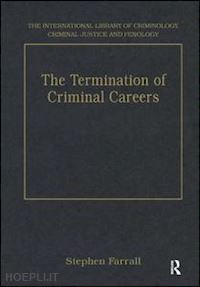Contents: Initial Explorations: A study of a delinquent community, John Barron Mays; The effect of social environment upon former felons, Dietrich C. Reitzes; Temporary and continuing delinquency, B.J. Knight and D.J. West; An exploratory study of existing from criminal careers, Thomas Meisenhelder; The short term careers of serious thieves, W. Gordon West; Delinquency cessation and adolescent development: preliminary data, Edward P. Mulvey and John F. LaRosa. Commonly Observed Regularities: Early marriage and criminal tendency in males, B.J. Knight, S.G. Osborn and D.J. West; Unemployment, school leaving and crime, David P. Farrington, Bernard Gallagher, Lynda Morley, Raymond J. St Ledger and Donald J. West; The criminal career: estimates of the duration and frequency of crime commission, William Rhodes; Delinquency: do the delinquents drop back in?, Kimberley L. Kempf; Going straight: desistance from crime and life narratives of reform, Shadd Maruna. Desistance By Specific Offending Populations: The later stages of ordinary property offender careers, Neal Shover; Growing focus on criminal careers, Constance Holden; Initiation, escalation and desistance in juvenile offending and their correlates, Rolf Loeber, Magda Stouthamer-Loeber, Welmoet van Kammen and David P. Farrington; Getting out of the life: crime desistance by female street offenders, Deborah Baskin and Jeffrey Fagan; Crime in the breaking: gender differences in desistance, Christopher Uggen and Candace Kruttschnitt. Theorising Desistance I - Rational Choice Models: Decisions to participate in and desist from 4 types of common delinquency: deterrence and the rational choice perspective, Raymond Paternoster; Age differential expectations and crime desistance, Neal Shover and Carol Y. Thompson; Earning prospects, matching effects and the decision to terminate a criminal career, Liliana E. Pezzin. Theorising Desistance II - the Life-Course Perspective: Adolescent-limited and life-course-persistent antisocial behaviour: a developmental taxonomy, Terrie E. Moffitt; Trajectories of change in criminal offending: good marriages and the desistance process, John H. Laub, Daniel S. Nagin and Robert J. Sampson; Life-course transitions and desistance from crime, Mark Warr; Structuration, human development and desistance from crime, Stephen Farrell and Benjamin Bowling; Name index.











